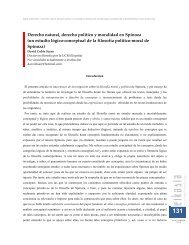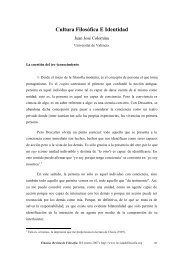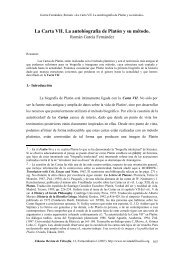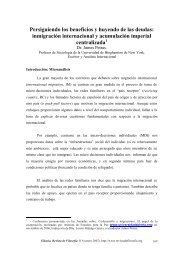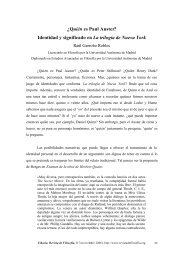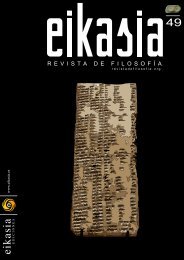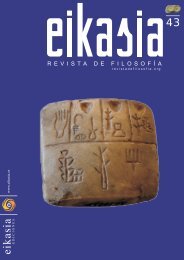- Page 1 and 2: 37 r e v is t a d e f ilo s o f ía
- Page 3 and 4: Eikasia. Revista de Filosofía, añ
- Page 5 and 6: Seminario Ignacio de Loyola y Balta
- Page 7 and 8: «Seminario Loyola - Gracián» —
- Page 9 and 10: «Seminario Loyola - Gracián» fil
- Page 11 and 12: «Seminario Loyola - Gracián» Sah
- Page 13: «Seminario Loyola - Gracián» ane
- Page 17 and 18: «Seminario Loyola - Gracián» ess
- Page 19 and 20: «Seminario Loyola - Gracián» by
- Page 21 and 22: «Seminario Loyola - Gracián» ret
- Page 23 and 24: «Seminario Loyola - Gracián» pra
- Page 25 and 26: «Seminario Loyola - Gracián» Ign
- Page 27 and 28: «Seminario Loyola - Gracián» Jer
- Page 29: «Seminario Loyola - Gracián» fri
- Page 32 and 33: «Seminario Loyola - Gracián» fun
- Page 34 and 35: «Seminario Loyola - Gracián» Má
- Page 36 and 37: «Seminario Loyola - Gracián» esc
- Page 38 and 39: «Seminario Loyola - Gracián» sis
- Page 40 and 41: «Seminario Loyola - Gracián» fun
- Page 42 and 43: «Seminario Loyola - Gracián» 2)
- Page 44 and 45: «Seminario Loyola - Gracián» pro
- Page 46 and 47: «Seminario Loyola - Gracián» ext
- Page 48 and 49: «Seminario Loyola - Gracián» dem
- Page 50 and 51: «Seminario Loyola - Gracián» cé
- Page 52 and 53: «Seminario Loyola - Gracián» con
- Page 54 and 55: «Seminario Loyola - Gracián» Con
- Page 56 and 57: «Seminario Loyola - Gracián» amb
- Page 59 and 60: La religión de la conquista del mu
- Page 61 and 62: «Seminario Loyola - Gracián» ens
- Page 63 and 64: «Seminario Loyola - Gracián» con
- Page 65 and 66:
«Seminario Loyola - Gracián» El
- Page 67 and 68:
«Seminario Loyola - Gracián» a r
- Page 69 and 70:
«Seminario Loyola - Gracián» hom
- Page 71 and 72:
«Seminario Loyola - Gracián» leg
- Page 73 and 74:
«Seminario Loyola - Gracián» Un
- Page 75 and 76:
«Seminario Loyola - Gracián» cre
- Page 77 and 78:
«Seminario Loyola - Gracián» agu
- Page 79 and 80:
«Seminario Loyola - Gracián» ún
- Page 81:
«Seminario Loyola - Gracián» has
- Page 84 and 85:
«Seminario Loyola - Gracián» ser
- Page 86 and 87:
«Seminario Loyola - Gracián» viv
- Page 88 and 89:
«Seminario Loyola - Gracián» de
- Page 90 and 91:
«Seminario Loyola - Gracián» Ign
- Page 92 and 93:
«Seminario Loyola - Gracián» 3.
- Page 94 and 95:
«Seminario Loyola - Gracián» maq
- Page 96 and 97:
«Seminario Loyola - Gracián» 4.
- Page 98 and 99:
«Seminario Loyola - Gracián» pol
- Page 100 and 101:
«Seminario Loyola - Gracián» que
- Page 102 and 103:
«Seminario Loyola - Gracián» dif
- Page 104 and 105:
«Seminario Loyola - Gracián» pag
- Page 106 and 107:
«Seminario Loyola - Gracián» Per
- Page 108 and 109:
«Seminario Loyola - Gracián» II
- Page 110 and 111:
«Seminario Loyola - Gracián» Don
- Page 112 and 113:
«Seminario Loyola - Gracián» que
- Page 114 and 115:
«Seminario Loyola - Gracián» bus
- Page 116 and 117:
«Seminario Loyola - Gracián» El
- Page 118 and 119:
«Seminario Loyola - Gracián» tra
- Page 120 and 121:
«Seminario Loyola - Gracián» gue
- Page 122 and 123:
«Seminario Loyola - Gracián» bio
- Page 124 and 125:
«Seminario Loyola - Gracián» Bar
- Page 126 and 127:
«Seminario Loyola - Gracián» Con
- Page 128 and 129:
«Seminario Loyola - Gracián» aco
- Page 130 and 131:
«Seminario Loyola - Gracián» y X
- Page 132 and 133:
«Seminario Loyola - Gracián» rac
- Page 134 and 135:
«Seminario Loyola - Gracián» Fig
- Page 136 and 137:
«Seminario Loyola - Gracián» Seg
- Page 138 and 139:
«Seminario Loyola - Gracián» pas
- Page 140 and 141:
«Seminario Loyola - Gracián» con
- Page 142 and 143:
«Seminario Loyola - Gracián» e i
- Page 144 and 145:
«Seminario Loyola - Gracián» cua
- Page 146 and 147:
«Seminario Loyola - Gracián» Tod
- Page 148 and 149:
«Seminario Loyola - Gracián» sof
- Page 151 and 152:
Gracián y el Oráculo manual: de l
- Page 153 and 154:
«Seminario Loyola - Gracián» req
- Page 155 and 156:
«Seminario Loyola - Gracián» El
- Page 157 and 158:
«Seminario Loyola - Gracián» pol
- Page 159 and 160:
«Seminario Loyola - Gracián» Por
- Page 161 and 162:
«Seminario Loyola - Gracián» “
- Page 163 and 164:
«Seminario Loyola - Gracián» tam
- Page 165 and 166:
«Seminario Loyola - Gracián» OM,
- Page 167:
«Seminario Loyola - Gracián» cla
- Page 170 and 171:
«Seminario Loyola - Gracián» El
- Page 172 and 173:
«Seminario Loyola - Gracián» han
- Page 174 and 175:
«Seminario Loyola - Gracián» car
- Page 176 and 177:
«Seminario Loyola - Gracián» fru
- Page 178 and 179:
«Seminario Loyola - Gracián» ter
- Page 181 and 182:
Pan de entendimiento: variaciones s
- Page 183 and 184:
«Seminario Loyola - Gracián» soc
- Page 185 and 186:
«Seminario Loyola - Gracián» imp
- Page 187 and 188:
«Seminario Loyola - Gracián» Es
- Page 189 and 190:
«Seminario Loyola - Gracián» «e
- Page 191 and 192:
«Seminario Loyola - Gracián» INT
- Page 193 and 194:
«Seminario Loyola - Gracián» se
- Page 195 and 196:
«Seminario Loyola - Gracián» pal
- Page 197:
«Seminario Loyola - Gracián» y d
- Page 200 and 201:
«Seminario Loyola - Gracián» Ben
- Page 202 and 203:
«Seminario Loyola - Gracián» ele
- Page 204 and 205:
«Seminario Loyola - Gracián» su
- Page 206 and 207:
«Seminario Loyola - Gracián» acr
- Page 208 and 209:
«Seminario Loyola - Gracián» es
- Page 211 and 212:
El Esquema Clásico en Gracián: co
- Page 213 and 214:
«Seminario Loyola - Gracián» 2.
- Page 215 and 216:
«Seminario Loyola - Gracián» sag
- Page 217 and 218:
«Seminario Loyola - Gracián» mil
- Page 219 and 220:
«Seminario Loyola - Gracián» sen
- Page 221 and 222:
«Seminario Loyola - Gracián» Una
- Page 223 and 224:
«Seminario Loyola - Gracián» La
- Page 225 and 226:
«Seminario Loyola - Gracián» Hé
- Page 227 and 228:
«Seminario Loyola - Gracián» Fig
- Page 229 and 230:
«Seminario Loyola - Gracián» La
- Page 231 and 232:
«Seminario Loyola - Gracián» cla
- Page 233 and 234:
«Seminario Loyola - Gracián» ami
- Page 235 and 236:
«Seminario Loyola - Gracián» alu
- Page 237 and 238:
«Seminario Loyola - Gracián» cor
- Page 239 and 240:
«Seminario Loyola - Gracián» 6.
- Page 241:
«Seminario Loyola - Gracián» des
- Page 245:
La religión de la conquista del mu
- Page 249:
La subjetividad encadenada. Crític
- Page 253:
La representación del sujeto barro






